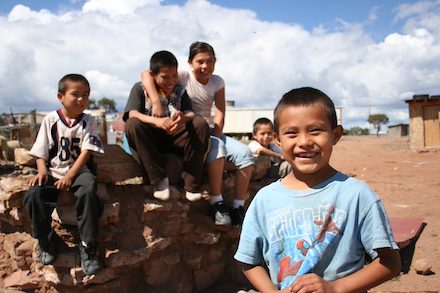Commitment to funding Native self-determination

For decades, Native American tribes have faced economic and food insecurity, education barriers, substandard and overcrowded housing, and limited healthcare—all tied to flawed federal policies and broken treaties. To address these inequities, our goal at Partnership With Native Americans (PWNA) is to boost reservation-based programs and projects that address immediate needs and long-term solutions. We partner with hundreds of reservation-based programs, improving quality of life for 250,000 Native elders, families, and children each year.
Building relationships for smarter grantmaking
Since 1990, PWNA—a Native-led organization—has advocated for the self-determination of Native communities. We believe those living in Tribal communities are best equipped to find solutions to the problems they face; they simply lack the resources to implement. So, for over 30 years, we’ve raised our voice for Native communities, building trust through shared goals and finding resources to support them.
Carefully listening to needs and wants has allowed us to build strong relationships and fund impactful grants. But this did not emerge overnight. Trust was built through efforts to understand the history of those we serve, respecting cultures and norms, supporting unique needs in each community, and aligning our grants to their values and priorities. In other words, grants are not for PR but for solutions.
Funding Native self-determination to fight COVID-19
PWNA saw first-hand the disproportionate impacts of the COVID-19 pandemic on the Tribal communities. Native Americans were nearly three times more likely to die from COVID than whites – a direct result of systemic and institutional racism, and less than 1% of U.S. charitable giving supporting Native causes.
We provided immediate COVID relief, sending trucks loaded with PPE and ordering $50,000 worth of food at a time to assist communities in need. We were able to transport these supplies quickly because of our longstanding partnerships and distribution network.
We also empowered tribal partners to determine the best use of funds for COVID impact in their communities. One program partner on the Crow Creek Reservation determined that their Tokata Youth Center and students needed support the most. A third of Native American students lack access to at-home internet for distance learning, and many of their youth, like other youth, were reporting depression and anxiety. PWNA provided $8,000 in disaster relief funding to heat the center so that Crow Creek tribal schoolteachers could tutor students. The funding also helped cover the cost of PPE and other supplies that kept youth active and mentally healthy. Plus, the partner used this opportunity to integrate First Tech robotic equipment into student activities to engage them in new technology and build STEM skills. This kept the students on track and prepared them for the future even while COVID restrictions were in place.
Lessons learned
So many outside groups have gone into Indian Country with their own solutions, only to fail. The key to creating impact is listening, supporting, and aligning your grants to the values and priorities of those you serve. Smart funders realize community leadership and engagement is essential to project continuation once the grant period ends. Racial and social inequities have impacted the tribes for decades, but this can change if funders are serious about social equity and remember Native Americans in their giving decisions.
To learn more about Partnership With Native Americans, follow us on Twitter, Facebook, Instagram, and LinkedIn.






